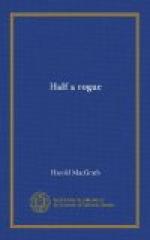“They’ll be doing all this to you some day,” John declared, as he and Warrington elbowed through the crowd, the dog between their legs.
“That’s him!” cried a voice.
“Who?”
“The fellow that writes; Henderson’s man.”
“Salt licks for him!” came in derision.
“He’ll give Donnelly a run for the money.”
“Not in a thousand years!”
All this amused Warrington.
“How d’ y’ do, Mr. Warrington?”
A hand touched the prospective candidate on the arm. Warrington saw Osborne’s rubicund nose.
“So you’re out, too, Mr. Osborne?”
“I never let meetings go by, Richard. Good evening, Mr. Bennington. A man with ten millions doesn’t look any different from ordinary mortals, does he? But he is different, or he wouldn’t have that barrel. A million is like a light-house; it attracts all sorts of birds.”
Warrington laughed and went on. Once or twice he lost the dog, but Jove managed to turn up each time.
“We’ll stand at the left,” said John; “it’s nearer the exits.”
“Just as you say. I wish I’d left the dog at home. He’s a nuisance in a crowd like this.”
They presently stood with their backs to the wall and looked toward the stage. Donnelly was already speaking about the great man who was that night to address them.
“And,” concluded the mayor, “Mr. Rudolph will lead us to a victory such as the party in this state has not yet known.” And half a hundred more final words. Man approaches nearest woman’s postscript when he says: “And, gentlemen, just one word more!”
Meantime Warrington’s gaze wandered here and there. He saw many familiar faces,—politicians, prominent merchants of both parties, and the usual exuberant hundreds drawn thither only by curiosity. These were willing to applaud anything and anybody, without knowing or caring what about. Quiet one moment, roaring the next; murmur, murmur, like angry waters on shingle. These make and unmake public men; they have nothing, but they can give everything. Strong tobacco smoke rolled ceilingward, and those on the stage became blurred and nebulous. Once Warrington caught a glimpse of a battered face, but it disappeared quickly. However, he said nothing to Bennington. Again, he saw McQuade moving about, within fifty feet. From time to time McQuade stooped, and Warrington knew that the white dog was present.
“Gentlemen,” concluded Donnelly, with a flourish, “William Henry Rudolph, of New York, our next governor.”
And, to quote the sympathetic reporters, “tremendous applause shook the rafters.” Mr. Rudolph rose majestically, and smiled and bowed. Heigh-ho! man accepts applause so easily; the noise, not the heart behind it; the uproar, not the thought. Man usually fools himself when he opens his ears to these sounds, often more empty than brass. But so porous is man’s vanity that it readily absorbs any kind of noise arranged for its benefit.




